|
|
Field invoicing on semi-rugged tablets
At profitability experts Marco in the UK, Samwell RUGGEDBOOK semi-rugged tablet computers play an increasingly important role in mobile applications where their combination of toughness, light weight, compact size, superior connectivity, and ability to provide on-the-spot documentation and invoicing increase productivity and profitability.
Business, by creating and sustaining jobs, is the lifeblood of the economy. It makes society possible, and the success or failure of business determines economic growth and prosperity, or the lack of it. By making and selling products and services, business creates value, income, and profit. The latter—profit—provides incentive to go into and stay in business. Japanese industrialist Konosuke Matsushita, the founder of Panasonic, once observed that profits are not a reflection of corporate greed, but a well-deserved vote of confidence from society that what is offered by a business is of value. Profit, of course, depends on numerous factors and can be quite elusive. In this article we'll examine how mobile technology, and ruggedized tablet computers in particular, can play an important role in achieving profitability.

Computers, of course, have been revolutionizing business for the better part of half a century, first via centralized mainframes and time-shared mini and supermini computers that then gave way to personal computers on every desk. Mobile computers have also been around for well over two decades, bringing computing power onto the road and into the field, automating processes and increasing productivity. The advent of the internet and high-speed data communication then connected the field with the office, resulting in additional gains in productivity. Much of those gains originated from automating business processes, moving them from pen and paper to electronic capture, storage, transfer, and analysis. The mere use of computers, however, does not automatically guarantee success. That requires careful examination of any given business and business process, and the creation of automated solutions that actually improve business instead of just automating it.
 At its very basic, business means creating and selling a product in exchange for monetary compensation. Since it takes money to create products or making services available, timely billing and collection of sales proceeds is just as important as the processes involved in creating products in the first place. While billing terms vary and may be negotiable, once they are agreed upon prompt billing has a direct impact on receipt of funds. In business, the time between the issuance of an invoice and when it gets paid may depend on the customer's paying discipline and practice, but the timing of issuing an invoice depends entirely on how quickly an invoice is generated and submitted to the client. At its very basic, business means creating and selling a product in exchange for monetary compensation. Since it takes money to create products or making services available, timely billing and collection of sales proceeds is just as important as the processes involved in creating products in the first place. While billing terms vary and may be negotiable, once they are agreed upon prompt billing has a direct impact on receipt of funds. In business, the time between the issuance of an invoice and when it gets paid may depend on the customer's paying discipline and practice, but the timing of issuing an invoice depends entirely on how quickly an invoice is generated and submitted to the client.
How does this relate to mobile technology and tablet computers? Very much. Depending on the type of business, having or not having proper mobile computing technology can mean the difference between a profitable business and a business failure. That's because any business that includes field service or work performed in the field relies on efficient invoicing. Unlike goods sold in stores where items are paid at the checkout counter, and unlike services provided in a dental or medical office, billing may be delayed until field service personnel is back in the office, which may be just hours, but can also be days or weeks. Delayed billing means delayed receipt of payment, which can have a direct impact on profitability.
What's the answer? For many businesses it means the ability to generate invoice documents in the field, right after goods have been sold or delivered, or a service performed. This seems obvious, but even today, many businesses still produce a manually prepared paper invoice and either leave it with the customer or, worse, mail it to the customer later. That increases both the likelihood of errors and the time until the invoice gets paid. How can a business avoid those pitfalls?
 The answer lies in carefully analyzing field operations and then coming up with solutions that make the business more profitable. It means thinking through every step of a business process, determine what is not as efficient as it could be, what may go wrong, and how it could be improved. This then leads to streamlined, optimized business procedures that employ the proper hardware and software to get the job done. It also leads to effective integration of the various systems used in a business, as well enhancing visibility, accountability and consistency within the entire process. The answer lies in carefully analyzing field operations and then coming up with solutions that make the business more profitable. It means thinking through every step of a business process, determine what is not as efficient as it could be, what may go wrong, and how it could be improved. This then leads to streamlined, optimized business procedures that employ the proper hardware and software to get the job done. It also leads to effective integration of the various systems used in a business, as well enhancing visibility, accountability and consistency within the entire process.
For an example, imagine a business where service engineers simply filled out paper forms after a field visit. The forms would then be processed by the office by staff unfamiliar with the technical aspects, and unable to get complementary documentation after the fact. As a result, billing would be late, inconsistent, and prone to errors. This same business might then engage in an analysis of its entire operation, examination of all of its processes, and creation of new systems that eliminate waste, sources of error and delays, and increase reliability and consistency for its own benefit and that of its customers. As a result, service engineers would be equipped with compact, trouble-free tablet computer hardware with software apps that address all aspects of a service call, included tasks and procedures, data capture, and the creation of photo, audio and video documentation. All of this can then be used to automatically generate invoice documents for customer acceptance and signature on the spot, automatic wireless transfer to the main office, and instant billing.
Properly implemented, such systems can have a direct impact on the sales and profitability of a business. System implementation costs can often be recovered within less than a year. It's a win-win proposition both for the business and its customers. And staff appreciates streamlined, easy-to-follow, time-saving and transparent processes.
Criteria for tablet computer-based field invoice and documentation generation
One of the reasons why field automation has traditionally lagged behind office automation is because until recently, field personnel was limited to the choice of either a laptop computer—which was large and not well suited for a lot of field work—and handhelds which did not have the required processing power or were not fully compatible with backend systems. The proliferation and enormous success of tablets over the past few years has fundamentally changed that. The tablet form factor is now fully accepted, and tablet hardware technology has advanced to a point where tablets can do the job of laptops, but in a lighter and more convenient form factor. There are, however, some non-negotiable requirements for field use of tablets. These are:
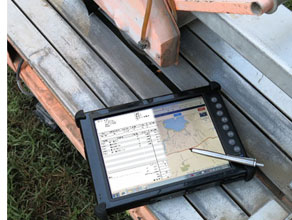
- Size and weight — tablets used in the field should neither be too large nor too small. Most field personnel are comfortable with a roughly 10-inch screen and a weight around three pounds (1.35 kg).
- Drop — since tablets are used while standing up and walking around, they may get dropped and must be able to withstand at least a three-foot drop.
- Sealing — tablets are used outdoors where there can be dust and rain; they must be able to handle such exposure. Fanless designs are preferred.
- Sunlight readability — the tablet's screen must remain readable outdoors and in direct sunlight, and it must effectively control reflections that mar almost all consumer tablets.
- Compatibility — while Apple's iOS and Google's Android dominate smartphones and a large part of the consumer tablet market, many businesses rely on Microsoft compatibility and security, and thus prefer Windows.
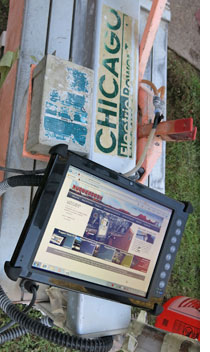 Connectivity and communication requirements are different for professional tablet computing equipment used in field service and invoicing as well. There may be the need to interface with a wide variety of customer gear and equipment, necessitating the ability to connect to and Connectivity and communication requirements are different for professional tablet computing equipment used in field service and invoicing as well. There may be the need to interface with a wide variety of customer gear and equipment, necessitating the ability to connect to and 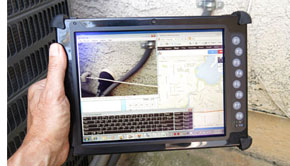 interface with anything from legacy systems and standards such as RS232 serial; to portable printers; to mainstream interface technologies like LAN, USB, GSM voice and data; data capture such as cameras, 1D/2D scanning, Smart Card, and RFID; and all the way to the latest technologies such as 3, 3.5 and 4G mobile broadband to securely communicate with backend servers and control systems. Consumer media tablets cannot meet those requirements. interface with anything from legacy systems and standards such as RS232 serial; to portable printers; to mainstream interface technologies like LAN, USB, GSM voice and data; data capture such as cameras, 1D/2D scanning, Smart Card, and RFID; and all the way to the latest technologies such as 3, 3.5 and 4G mobile broadband to securely communicate with backend servers and control systems. Consumer media tablets cannot meet those requirements.
In addition, any tablet used in the field must be as reliable, trouble-free and maintenance-free as possible. That means ruggedized, industrial-grade design and fanless construction. The tablet must be simple to operate and work under adverse environmental conditions. While capacitive touch screens dominate in consumer products, they are not optimal in field service tablets that may be used with gloves on and in the rain where resistive digitizers work much better.
What's needed is gear that is tough enough to survive falls when it is carried around, protected enough to get rained on, but not overbuilt so that it becomes too large and heavy. Equipment that's advanced and powerful enough to run full Microsoft Windows, but without unneeded speed, heat generation and power consumption. Equipment that is flexible and configurable enough to support whatever it needs to work and communicate with, and equipment that is standard enough not to cost a fortune.
Rugged tablet computers such as the Samwell RUGGEDBOOK SR750 (shown in the pictures above) fill all those requirements, and that's why the factory profitability experts at Marco in the UK are using the handy tablet to help their corporate clients streamline their operations and profitability. Marco designs, manufactures and installs their tried and tested Trac-IT Control Modules to ensure that customer business-critical systems are fully implemented and supported in the most efficient, timely and professional manner.
On the hardware side, the Samwell RUGGEDBOOK 750 provides full Windows functionality and performance in a hardened, fanless compact form factor that works equally well in service trucks, in the field, or in the office. Measuring just 10.8 x 7.8 x 1.1 inches (275 x 198 x 28 mm) and weighing just over three pounds (1.35 kg), the SR750 is thinner and considerably lighter than fully-rugged tablets without requiring many compromises. There is excellent onboard wired connectivity, all connectors are standard size, and there is a wealth of wireless functionality (including available GPS and 3.75G radio) and also an integrated camera, optional laser scanner and optional RFID reader. The device can easily be carried and just as easily mounted almost anywhere via standard VESA mounts.
Relevant Information:
To learn more about the ruggedized Samwell SR750 tablet computer and its many applications, email RUGGEDBOOK at info at ruggedbook.com.tw. And check RuggedPCReview.com's full analysis of the SR750.
RUGGEDBOOK Headquarters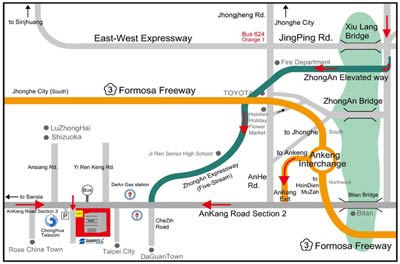
Samwell Building
317-1, Sec. 2,
AnKang Rd., Xindian Dist.
New Taipei City 23153, Taiwan (R.O.C.)
Telephone: 886-2-2214-1133
Fax: 886-2-2215-5458
Web: www.ruggedbook.com.tw
info@ruggedbook.com.tw
|

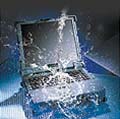




 At its very basic, business means creating and selling a product in exchange for monetary compensation. Since it takes money to create products or making services available, timely billing and collection of sales proceeds is just as important as the processes involved in creating products in the first place. While billing terms vary and may be negotiable, once they are agreed upon prompt billing has a direct impact on receipt of funds. In business, the time between the issuance of an invoice and when it gets paid may depend on the customer's paying discipline and practice, but the timing of issuing an invoice depends entirely on how quickly an invoice is generated and submitted to the client.
At its very basic, business means creating and selling a product in exchange for monetary compensation. Since it takes money to create products or making services available, timely billing and collection of sales proceeds is just as important as the processes involved in creating products in the first place. While billing terms vary and may be negotiable, once they are agreed upon prompt billing has a direct impact on receipt of funds. In business, the time between the issuance of an invoice and when it gets paid may depend on the customer's paying discipline and practice, but the timing of issuing an invoice depends entirely on how quickly an invoice is generated and submitted to the client.
 The answer lies in carefully analyzing field operations and then coming up with solutions that make the business more profitable. It means thinking through every step of a business process, determine what is not as efficient as it could be, what may go wrong, and how it could be improved. This then leads to streamlined, optimized business procedures that employ the proper hardware and software to get the job done. It also leads to effective integration of the various systems used in a business, as well enhancing visibility, accountability and consistency within the entire process.
The answer lies in carefully analyzing field operations and then coming up with solutions that make the business more profitable. It means thinking through every step of a business process, determine what is not as efficient as it could be, what may go wrong, and how it could be improved. This then leads to streamlined, optimized business procedures that employ the proper hardware and software to get the job done. It also leads to effective integration of the various systems used in a business, as well enhancing visibility, accountability and consistency within the entire process.

 Connectivity and communication requirements are different for professional tablet computing equipment used in field service and invoicing as well. There may be the need to interface with a wide variety of customer gear and equipment, necessitating the ability to connect to and
Connectivity and communication requirements are different for professional tablet computing equipment used in field service and invoicing as well. There may be the need to interface with a wide variety of customer gear and equipment, necessitating the ability to connect to and  interface with anything from legacy systems and standards such as RS232 serial; to portable printers; to mainstream interface technologies like LAN, USB, GSM voice and data; data capture such as cameras, 1D/2D scanning, Smart Card, and RFID; and all the way to the latest technologies such as 3, 3.5 and 4G mobile broadband to securely communicate with backend servers and control systems. Consumer media tablets cannot meet those requirements.
interface with anything from legacy systems and standards such as RS232 serial; to portable printers; to mainstream interface technologies like LAN, USB, GSM voice and data; data capture such as cameras, 1D/2D scanning, Smart Card, and RFID; and all the way to the latest technologies such as 3, 3.5 and 4G mobile broadband to securely communicate with backend servers and control systems. Consumer media tablets cannot meet those requirements.
